
The Definitive Mobile Marketing Strategy for 2024
You’ve optimized your website for mobile visitors and follow Google’s mobile-first indexing best practices.
You removed your clunky lead forms and ungated your content.
You use responsive email templates, buttons instead of hyperlinks, and include plenty of whitespace in your email copy.
While these things are all important for creating mobile-friendly marketing content, they aren’t actual mobile marketing strategies.
Mobile marketing ideas and strategies reach people through mobile channels, like text and apps, specifically. Yes, even B2B! When was the last time you saw a business professional without a smartphone in their hand? Exactly.
We’re on our phones all the time. Ericsson even predicts mobile traffic to increase another 25% by 2025 – with usage in North America and Asia rising far beyond the global average:
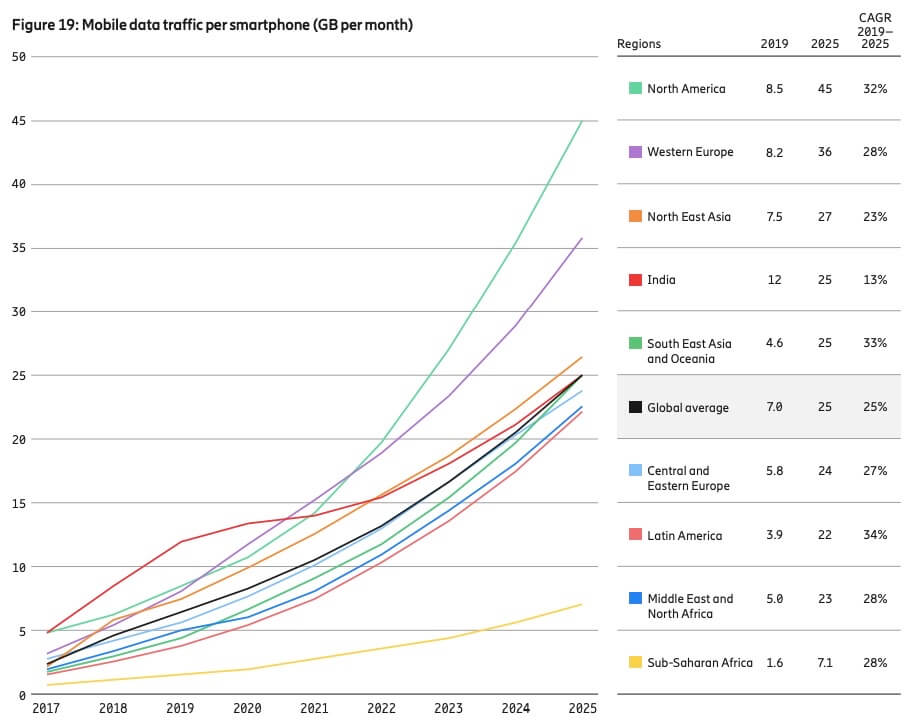
You can’t neglect mobile marketing – It’s incredibly valuable because it gives you a direct line of communication with your audience.
No fighting against newsfeed algorithms. No hoping the right people click your ads or headlines in organic search results.
Look at your Google Analytics right now. I’d bet at least half of your visitors browse your website content from mobile devices. If not, that’s a red flag you need to improve your mobile marketing strategies.
Quick Takeaways:
- People around the world – whether B2B buyers or consumers – are spending far more time on their phones thanks to the pandemic and increased mobile accessibility.
- You need a dedicated mobile marketing strategy to reach your audience on their mobile devices.
- Your mobile marketing strategies should target specific audience segments with concise content, engaging copy, and interactive features.
Break your existing mobile audience up into segments and use the data to create personas for targeted content. Make sure to include personas for segments that might engage more with your brand from a smartphone if you had more relevant mobile content available.
1. Use SMS Marketing
Texts are simple yet effective and can stretch your budget.
Plus, the right copy makes SMS incredibly personal and conversational – perfect for boosting engagement in whatever you’re promoting.
SMS texts can be sent to anyone with a cellphone. You don’t even need a smartphone to use SMS, broadening your customer base if certain segments don’t own smartphones.
SMS mobile marketing strategies work best as part of a multichannel marketing strategy:
- Text subscribers after sending your monthly newsletter to increase email opens
- Send reminder notices of “last day to buy” sales on your website
- Offer SMS-only coupons during slow seasons or slumps
- Send last-minute offers for new products or soon-to-be-retired products
- Post your SMS shortcode on your TV commercial, podcast ad, or social media copy to gain new subscribers
- Ask for feedback via SMS about your customer experience or service and reward respondents with a discount
- Alert your SMS subscribers to relevant blog content, eBooks, or case studies in their niche
- Share your latest video or podcast link.
Consider your unique niche, audience, and content you publish. Make sure to use conversational and friendly copy, so avoid sounding salesy or spammy.
Keep your SMS texts to a minimum to avoid annoying your audience and stick with one topic per text.
2. Boost Social Media Marketing Strategies on Mobile
Instagram, TikTok, Snapchat – although most of these apps offer desktop versions, most scroll them on mobile devices.
If your B2B buyers fit into the demographics of people who use these apps, guess what? They’re probably hanging out there too.
Keep your mobile marketing strategies for these social media apps casual and fun. Instead of promoting products and services, share things like:
- Behind-the-scenes videos and images
- Videos and images highlighting your company culture
- Content from your employees
- Employee chats and interviews
- Clips from events and podcasts
These consumer-facing apps are fun and give you an opportunity to connect on a more personal basis. Plus, Instagram and TikTok both make it extremely easy to reach wide audiences with interesting content.
Mailchimp really stands out as an example of a B2B doing Instagram right:
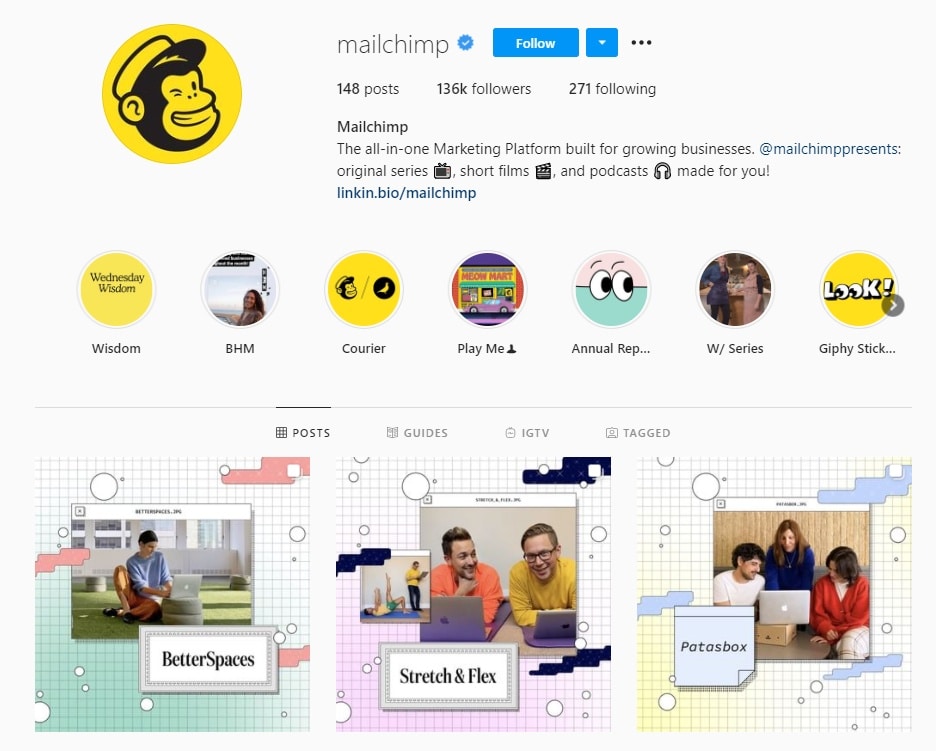
TikTok even offers a special influencer marketplace for brands to partner with users who match your audience, content, and culture.
3. Build Your Own App
With more people working remotely and setting their own hours, the way people spend time online has changed too. Search volume after midnight went up by 15% for example:

By designing your own app, you can engage your audience anytime.
Make sure your app offers value without forcing users to buy anything:
- Instant access to your content
- Personalized content streams
- Curated content from other sources
- Customizable content
- Podcasts and videos
- Relevant games
- Specialized chat
- Niche forums
- Calculators or useful tools
Your app should serve as one location for your audience to access your content, engage with your brand, and engage with other audience members without opening a browser to visit your website.
You can also time push notifications to go out by time zone, action, or even as a user opens their phone.
4. Create Video Content
Video is by far the audience favorite so make sure to include video in your mobile marketing strategies.
63% of all mobile traffic is video right now but that figure will rise to 76% by 2025.
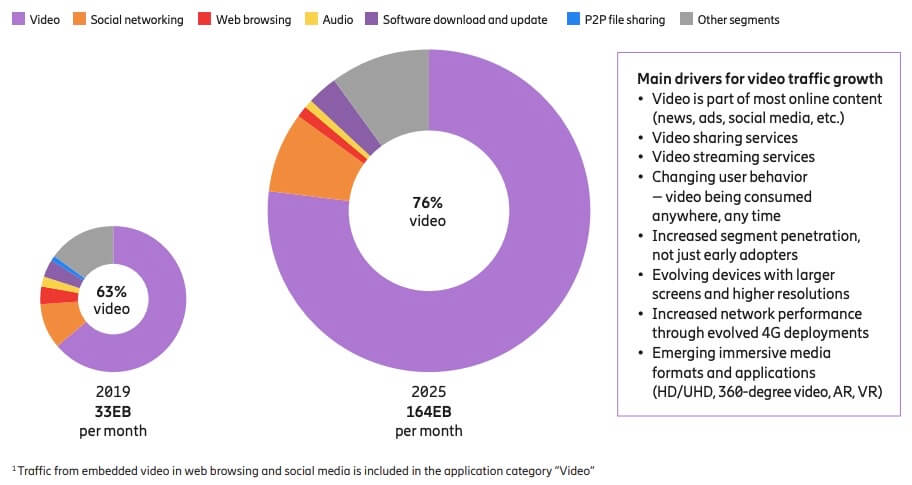
Get creative to grab your audience’s attention. You can even embed links right into the context of the video to get people to your site.
Mailchimp, for example, has a handful of entertaining and inspiring video series specifically targeting entrepreneurs and small business owners. They aren’t your typical content marketing – these videos feel more like a short documentary or movie.
What topics do your audience segments care about or find interesting? How can you work them into an interesting video series?
5. Rethink Your Mobile Content Marketing Strategies
Over half of all Google searches happen on mobile devices.
You might be tempted to run some targeted mobile ads – and they might perform slightly better than desktop ads – but don’t even waste your time and money.
PPC advertising doesn’t work. The data isn’t as accurate as it seems and it usually doesn’t deliver the ROI you need. In fact, PPC is extremely costly.
Instead, optimize your content marketing strategy for mobile users:
- Don’t gate all your content behind intrusive lead forms.
- Let visitors freely browse your content.
- Avoid popups.
- Write in short concise sentences with plenty of white space.
- Don’t write long paragraphs.
- Use casual language.
- Include plenty of images and videos throughout your copy.
- Offer downloadable content like eBooks and podcasts.
- Add interactive elements.
6. Personalize Your Mobile Marketing Strategies
Starting a text message or email with “Dear Valued Customer,” is a surefire way to lose your reader’s interest and never get it back. Address your audience by their first name to build a personal relationship.
If your brand image is more formal, use honorifics with last names. Otherwise, a first name creates a friendly, casual tone that encourages readers to at least hear you out.
But don’t stop there – customize your offerings based on your readers’ location, purchase history, interests, birthday, content behavior, or other data.
For example, if a customer recently purchased a computer, you could send coupons for flash drives, mouse pads, software, etc. It’s all about building trust and engagement.
7. Optimize Your Mobile Email Marketing Strategies
About half of all emails are opened on mobile devices. Furthermore, 35% of all business professionals check email on their smartphone while 73% of millennials prefer to hear from brands via email.
Most modern email service providers should offer advanced segmentation techniques so you can break your audience up into groups based on which email clients and devices they typically open your emails.
Once you have your mobile subscribers sectioned off, create unique email mobile marketing strategies just for them:
- Stick to a single topic
- Consider how much content will display during each scroll
- Design your layout with an S shape to guide eyes down the body
- Use large and clear fonts
- Use CTA buttons instead of hyperlinks
- Keep subject lines under 30 characters
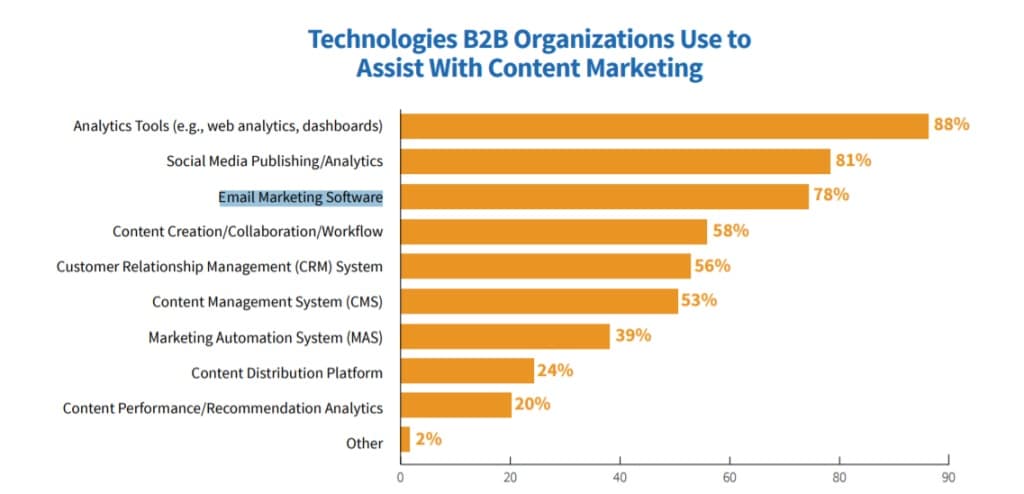
Content Marketing Institute
8. Offer Tangible Value Through Your Mobile Content
The end goal of any marketing campaign is to drive a sale – but that doesn’t mean every message or ad should scream “buy now!” Your mobile marketing strategies must provide immediate value.
Your mobile content should:
- Teach your readers something new
- Inspire them to try something different
- Appeal to emotions
- Make them laugh
- Answer questions they have
- Offer solutions to problems
Value creates engagement. Engagement leads to trust. Trust drives purchases.
Examples of value-based mobile marketing include short tutorials, video tours, personal stories, calculators, and gamification in apps.
9. Create Incentives
Let’s say you have a large audience and publish valuable content regularly. Still, sales could be a bit higher. Remember that you’re not the only business vying for your readers’ attention.
Snag that top-of-mind position and spread reach with:
- Unique coupon codes
- Personalized weekly specials
- Rewards programs
- Referral programs
- Contests
- User-generated content submissions
Incentives, especially loyalty and referral programs, give your audience a reason to talk about your brand and the services you offer. Even today, nothing beats authentic word-of-mouth advertising!
10. Promote Reviews
Most consumers say they read reviews via their mobile browsers:
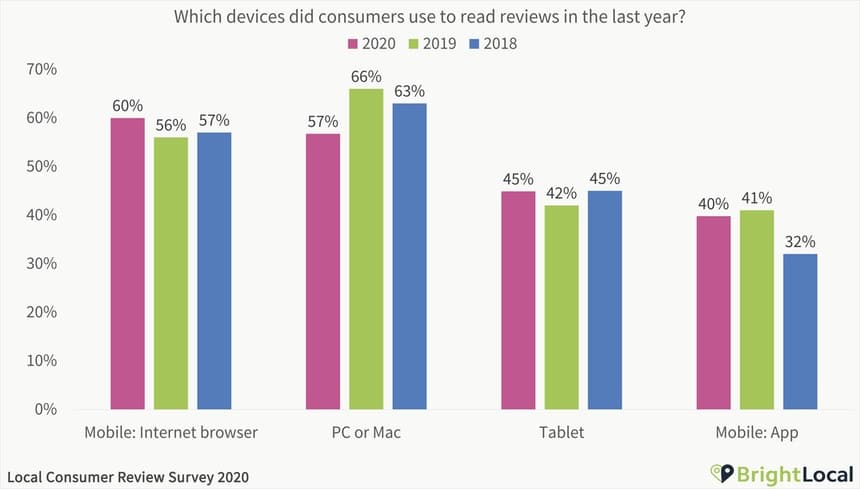
With B2B buyers skewing younger these days, there’s no reason to assume your B2B buyers are restricting themselves to PCs here either.
Mobile marketing strategies offer the perfect place to ask for reviews and share reviews.
Reviews are all about timing and tact. No one reads an email asking for a review, decides to leave one later, and actually goes back to write the review.
No, you need mobile marketing tactics like push notifications, mobile-targeted emails, and targeted social media apps to add urgency. The right language can grab attention immediately and push customers to leave a review then and there – not later.
What Mobile Marketing Strategies Will You Use in 2024?
Most of us are attached to our phones all hours of the day. We use them to research solutions and ideas, watch funny cat videos, listen to industry podcasts, and interact with colleagues – all within the span of a few hours!
If you want to succeed in 2024, mobile cannot be an afterthought. You need to develop concrete mobile marketing strategies to reach your audience with personalized (and interactive) content.
Think of your audience segments first. What kind of content would they want to see on their phone screen? How can you use your expertise to add value to their lives this way?
That’s why mobile helps you move away from promotional advertising and towards valuable relationship building. Don’t neglect it!
Running out of content ideas? Our Content Builder packages include specialized content strategy in your niche so you always have engaging (and mobile-friendly) content to share!






